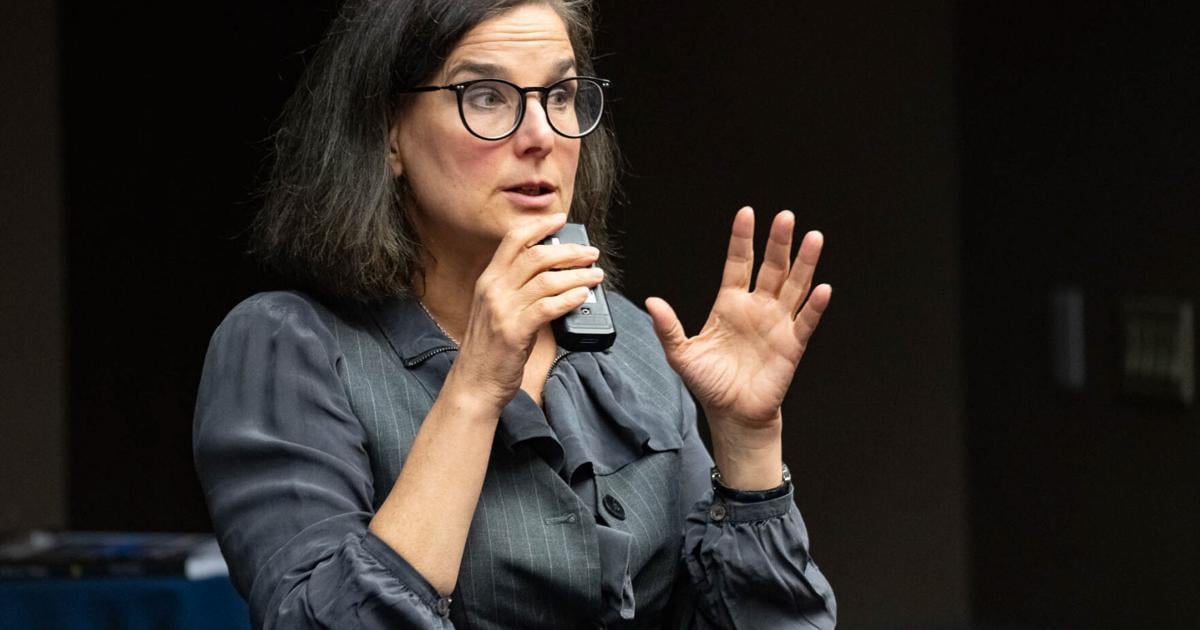Susanne Beyer, a German author who works on the executive board for Der Spiegel, a German news magazine, visited NAU as the featured speaker for the Martin-Springer Institute’s “Post-War/Post-Wall: Journalism in Times of Polarization” conversation at the University Union on Sept. 29, discussing journalism and polarization.
About 70 people attended the event, with the reception starting at the Berlin Wall exhibit outside the Grand Canyon room. Björn Krondorfer, director of the Martin-Springer Institute, started the event by introducing Beyer and her book, “Kornblumenblau,” before asking her questions relating to journalism. Near the end, Krondorfer opened the discussion to the audience.
Björn Krondorfer addresses the audience and formally introduces Susanne Beyer and her book, “Kornblumenblau” at the “Post-War/Post-Wall: Journalism in Times of Polarization” conversation in the University Union, Sept. 29. Elliott Stringer/The Lumberjack
Beyer has worked with the magazine for almost 30 years. She is also working with the Thomas Mann House Fellowship to investigate whether mediation can strengthen democracy.
Der Spiegel is one of Germany’s most popular news magazines. It is primarily known for its investigative pieces but also covers politics, business, culture and entertainment.
Beyer said American and British press officers heavily influenced Germany’s journalism after the Berlin Wall fell in 1989. She said through these experiences, Germany still has a strong connection to America and continues to feel “lovesick” for what America used to be.
Susanne Beyer answers a question about journalism during times of polarization during the “Post-War/Post-Wall: Journalism in Times of Polarization” conversation in the University Union, Sept. 29. Elliott Stringer/The Lumberjack
“The press officers told me, but I should say us, how to keep distance to government, how to keep critical about government,” Beyer said. “I think this very, very tight connection to America comes from this very special history.”
Beyer said Germany strongly relies and depends on America due to the countries’ history during WWII. She said they like and adopt American culture and closely follow American politics.
While Beyer said Germans rely on America, they are not always in agreement. She said maintaining relationships in politics is important, especially when the political environment is polarizing. Considering what other world leaders think about Germany’s chancellor, Friedrich Merz, is critical.
“We are in this conflict, being dependent on America but not so very happy about America,” Beyer said. “I think it comes to journalism. It is as ambiguous as the political situation. We always ask ourselves, ‘What is the right way to behave?’ When our chancellor is in the White House, how should we behave? Was it a nice visit? Does Donald Trump like us?”
She said while German reporters do not have to worry as much about censorship, they are usually cautious and respectful when reporting about political figures to maintain relationships and not slander them.
Björn Krondorfer asks Susanne Beyer about censorship in the media in Germany at the “Post-War/Post-Wall: Journalism in Times of Polarization” discussion located in the University Union, Sept. 29. Sarah Manning/The Lumberjack
Phaedra McLellan, a freshman studying astrophysics, said she attended the discussion to fulfill one of her explorations she needed for honors, and she enjoyed hearing a German journalist’s perspectives, especially when the American and British press officers taught German journalists how to report.
“I’m almost wondering, maybe that could be another thing,” McLellan said. “Maybe we need to start relearning here.”
There have been increased attacks on German journalists by far-right groups, such as The Third Path and the Alternative for Germany political party. Many people who take part in these groups have started to view the press as an enemy.
McLellan said she believes American journalism is not in a good state, and she does not want this change in journalism to happen elsewhere. When she heard it was starting to happen in Germany, she said she was shocked and disappointed.
“I think, in a lot of places, there’s way too much persecution and targeting of journalists,” McLellan said.
Shortly after Charlie Kirk’s assassination on Sept. 10, President Donald Trump said he would take away news organizations’ broadcasting licenses if they reported anything negative about him or the Trump administration, simultaneously making threats to imprison reporters who speak out against him.
With the dangers of journalism rising in death threats, self-censorship, harassment, violence and online violence, concerns rise about how journalism will look in the future.
Björn Krondorfer (left) discusses the contents of Susanne Beyer’s (right) book, “Kornblumenblau.” Susanne Beyer (right) holds up her book to the audience during the “Post-War/Post-Wall: Journalism in Times of Polarization” conversation in the University Union, Sept. 29. Elliott Stringer/The Lumberjack
Beyer discussed the death and assault threats she was receiving as a journalist. She said in many places, being a journalist is becoming more and more difficult. McLellan said she appreciated the transparency with which Beyer spoke about providing news and information as accurately as possible.
After the event, guests stayed afterward to ask Beyer more questions about her book and politics. She will continue to investigate if mediation can strengthen democracy and if journalistic formats can be developed that encourage different perspectives and a balance of interests.
